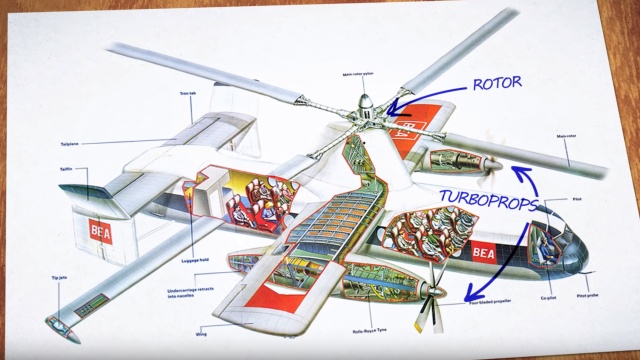If a helicopter and an aeroplane had a little Einstein genius baby, that baby would be the Fairey Rotodyne, a passenger airliner that was said to be capable of vertical takeoff. It was supposed to be the hot new thing almost six decades ago—the way everyone would be getting around. And then, shockingly, it failed.
The Rotodyne was revolutionary for multiple reasons. While it looked like a helicopter, the main rotor on top—which, on a helicopter, is powered by a motor—wasn’t actually connected to anything. That rotor would only spin with a natural airflow passing over it, kind of like a pinwheel. But that unpowered rotor on top did most of the heavy lifting for the plane. Which meant it was a hell of a lot faster than any helicopter out there, but it could still be flown from helipad to helipad.
Intrigued? This video from Mustard really dives down into the technical aspects of what made this machine so special—and why it ultimately ended up being a disappointment
So, if the rotor on top doesn’t actually power itself? Then how is this thing supposed to hover? That’s all taken care of by tip jets at the end of each rotor blade. That’s some pretty nifty technology for 1959, and people were interested.
But then the Fairey Rotodyne just… disappeared.
(Well, it didn’t disappear so much as everyone involved quietly tried to disappear from the face of the earth when all its problems came to light.)
Problem one: the tip jets on the rotors were fucking loud. Like, almost aeroplane-take-off loud. You can’t do that shit right in the middle of a city, which was the whole point of the Rotodyne.
Problem two: Fairey didn’t have enough money to get to work producing all the models it had sold. Back in Britain at the time, there were a ton of aircraft manufacturers but not a ton of planes, and they were all relying on governmental funds to figure their mess out. A forced merger of companies included Fairey Aviation, and by that point, The Powers That Be (aka the people with money) were too concerned with regular ol’ aeroplanes than this new, interesting technology.
Orders were pulled. Then the government pulled the funding it had already given for development. And then the Rotodyne—including the prototypes and the research that went into creating it—was destroyed. Actually, physically, destroyed.
Could this technology be viable today? You’d think that we’d be far more capable of developing a quiet, functional helicopter-aeroplane hybrid in 2019 than in 1959. But it also asks the question if we really need yet another mobility startup and, well, you can easily see Rotodyne Round Two suffering a similar fate.
